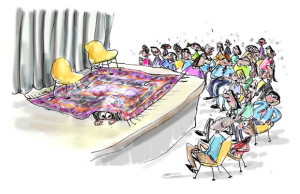
Some artists might claim that they don’t care what other people think. They write “for themselves” and if anyone likes it – great. If not – great. And one in a thousand of those artists might have a point, although I actually doubt it.
In the vast majority of cases, you’re not an island, and your music is a way for you to communicate with others. You therefore need to know that they’re “getting” what you’re saying/singing/playing.
It is therefore a good idea to test the water before you dive in (i.e. before you attempt to SELL or PROMOTE your music). If you’re going to spend endless hours and effort not only writing and creating your music but also building a music business, and then spending money to get it all off the ground, the LEAST you can do is to check before you leap.
[emember_protected for=3-4-5]
Try to get your music exposed anonymously to test groups. Watch them carefully and take notes.
Perhaps even poll them in some instances. Or post a competition online inviting feedback. Thick skin will help!
But be aware of the two sides of feedback: on the one hand, don’t take it personally and know what is relevant and what is not. On the other hand, watch very intently for the silent cues.
When presenting your music to test groups or individuals, you will get a completely different reaction if they KNOW it’s YOUR music, than if they don’t.
 Typically, I try never to tell people it’s my music when I test it in pre-production or pre-release stages. I prefer to observe quietly and anonymously, if at all possible. If they stop paying attention or if they actively voice their annoyance – that’s something I would never know if they knew they were being watched by the author himself. Also, if they’re grooving away and seem totally into it, that’s something I might find harder to believe had they known beforehand that they’re listening to MY music.
Typically, I try never to tell people it’s my music when I test it in pre-production or pre-release stages. I prefer to observe quietly and anonymously, if at all possible. If they stop paying attention or if they actively voice their annoyance – that’s something I would never know if they knew they were being watched by the author himself. Also, if they’re grooving away and seem totally into it, that’s something I might find harder to believe had they known beforehand that they’re listening to MY music.
The hard part is in taking all the observations onboard. Each song-test results in further revisions, more often than not.
But there’s one more hugely important thing. Are you sure you’re exposing your music to the RIGHT audience? If you’re into some kind of tweenie pop, testing the music on metal-heads will be a total waste of time! Be sure you select your test audience as carefully as you can. And – make sure you learn ALL you can about them. What sounds do they like and what sounds are old hat. Who are they, where do they hang out, who in their minds is hot and who’s not – everything you can.
Believe it or not, the situation is very similar in case of “more ambitious” music. You may be into some advanced jazz-rock fusion or whatever and your audience might be very musically savvy and demanding – but they’re still an audience and you still need to know all you can about them and what makes them tick.
This is why it’s best to create music in your NATURAL NICHE where you can speak from its point of view. If you’re a punk and play punk music, it’s going to be much easier for you to understand what your market respects and what it doesn’t!
But also remember to have a “representative sample” of your target audience. This means that if 3 or 4 of your friends tell you they love your stuff, do you really think you can extrapolate this to the “entire” niche?
The trick is to LISTEN, pay attention to subtle cues, ask questions (when appropriate) and – at the same don’t compromise what you consider are your greatest strengths and values. Look for that elusive common ground between what you know and want to achieve and what the market is telling you.
[/emember_protected]
 |
 |
 |
| Book 2 – Chapter 7 The A&R Process |
Course Overview | Book 2 – Chapter 9 Your Image |
Book 2: 1, 2, 3, 4, 5, 6, 7, 8, 9, 10, 11, 12, 13, 14, 14b, 15, 16, 17, 18, 19, Overview

